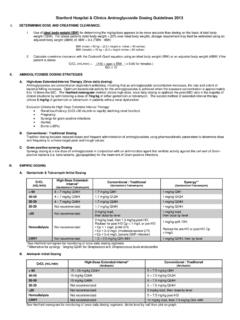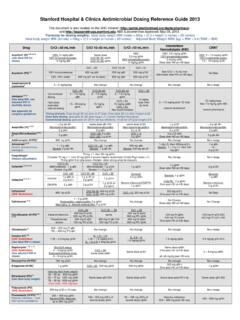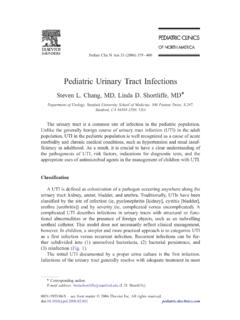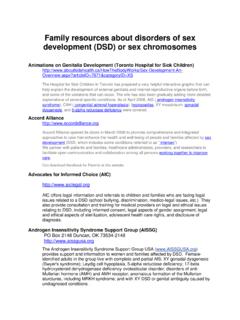Transcription of Laryngopharyngeal Reflux (LPR) Protocol
1 Laryngopharyngeal Reflux (LPR) Protocol C. Kwang Sung, MD, MS LPR is the retrograde (backward) movement of stomach enzymes (Pepsin) and acid into the lower throat region. LPR patients are usually unaware of LPR and, unlike Gastroesophageal Reflux disease (GERD) patients, do not usually complain of heartburn (only 35% do complain). When the lining of the throat is irritated by stomach contents, there is secretion of a mucus blanket in an attempt to protect the lining from the caustic agents. Patients can manifest symptoms such as excessive throat-clearing (especially in the morning or after a meal), persistent dry cough, sore throats not associated with a cold, hoarseness, or the feeling of a lump in the throat.
2 The treatment of LPR takes a three-pronged approach with attention to diet and behavior changes, and use of acid blocking medicines. Diet Changes Different foods affect LPR by different mechanisms. These specific foods should be avoided or reduced drastically, or they will interfere with the healing process: Caffeine, alcohol, chocolates, and peppermints weaken the lower esophageal sphincter, which normally holds in the stomach contents. Citrus fruits, kiwi, pineapples, tomatoes (and other acidic foods), spicy deli meats, and hot spices (hot mustard, curry, hot peppers) directly irritate the throat lining.
3 This means that even if the medicines are working well, eating these foods will cause direct irritation and inflammation of the throat lining. Carbonated beverages (such as sodas and beer) bring acidic contents into the throat. Beware of even non-caffeinated soda. Behavior Changes Do not increase the pressure within the abdomen for at least 2 hours after eating (no bending over, exercising or singing), as it will force contents into the throat. Do not over-distend the stomach (eat smaller meals throughout the day, instead of 3 larger meals). Do not lie down within 3 hours after eating a meal.
4 Do not eat a snack or drink before going to sleep. Prop up the head of your bed with a 4-inch wedge to allow gravity to help keep contents in your stomach. Medicines Proton Pump Inhibitors (PPIs) are the most effective medicines for the treatment of LPR. Remember that LPR is different from GERD and its successful treatment requires higher doses of medicine for a prolonged period of time. The initial trial of medicines is at least 6 months, at twice-a-day dosage (depending on the severity of LPR changes seen on examination). Symptoms should start to improve within 4 to 6 weeks after you start taking the medicines.
5 The visual signs lag behind the symptomatic relief by several months. PPIs stop acid production in the stomach for 12 to 17 hours (this is why a twice-daily dose is necessary), helping to decrease the irritation potential of the stomach contents. PPIs must be taken on an empty stomach, hour before a meal. The most effective dose is the morning dose. Portions of text by permission from Ramon A. Franco Jr, MD Use antacids (such as Tums or Rolaids ) liberally hour after meals (2 tablets) or hour before singing or exercising. Some patients may require a second class of medications (H2-blockers) to help control nighttime symptoms.
6 H2-blockers are a form of anti-histamine that interfere with the signals that cause stomach acid to be produced. These medications are not as strong as PPIs, but are more effective during sleep. Please keep in mind the lag between the time you take the medicine and the time you start feeling symptom relief. People who stop taking the medicines typically feel fine for 1 to 3 weeks and then notice a gradual return of symptoms. It takes a few weeks to get back to where they were before. Some people successfully come off of the medicines but need to follow a strict diet. There is no free lunch when it comes to Reflux ; you need to do your part to keep it under control.
7 Characteristics of LPR Laryngopharyngeal Reflux (LPR) is also known as extraesophageal Reflux disease . It results from chronic acid and pepsin exposure to the larynx. Common LPR symptoms include Hoarseness Thick or too much mucus Chronic throat irritation Chronic throat-clearing Chronic cough Voice problems Cough that wakes you from your sleep Differences between LPR and GERD GERD, or gastroesophageal Reflux disease , occurs when stomach acid and enzymes backflow into the esophagus, causing heartburn (burning sensation in the chest) and damage to the esophageal lining. LPR occurs when stomach acid and/or food enzymes backflow all the way back into the lower part of the throat (laryngopharynx).
8 Not everyone who has Reflux has LPR. LPR in the absence of GERD Many people with LPR do not have symptoms of heartburn. Compared to the esophagus, the voice box and the back of the throat are significantly more sensitive to the effects of acid/pepsin on the surrounding tissues. Acid that passes quickly through the food pipe does not have a chance to irritate the area for too long, However, acid that pools in the throat around the voice box causes prolonged irritation, resulting in the symptoms of LPR. Throat-clearing alternatives If you sense a build-up of secretions in the throat, try swallowing or taking a sip of water.
9 You can also use a silent cough by pushing as much air as you can from the lungs in a short blast. The only sound should be a rush of air, then swallow.










